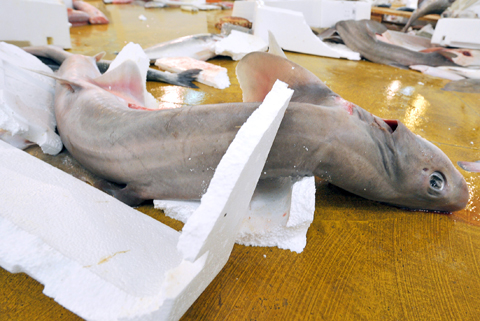Riots, protests and political unrest could multiply in the developing world as soaring inflation widens the gap between the "haves" and "have nots," an investment bank predicted on Thursday.
Economists at Merrill Lynch view inflation as an "accident waiting to happen." As prices for food and commodities surge, the bank expects global inflation to rise from 3.5 percent to 4.9 percent this year. In emerging markets, the average rate is to be 7.3 percent.
The cost of food and fuel has already been cited as a factor leading to violence in Haiti, protests by Argentinian farmers and riots in sub-Saharan Africa, including attacks on immigrants in South African townships.

PHOTO: AFP
Merrill’s chief international economist, Alex Patelis, said this could be the tip of the iceberg, warning of more trouble “between nations and within nations” as people struggle to pay for everyday goods.
“Inflation has distributional effects. If everyone’s income moved by the same rate, you wouldn’t care — but it doesn’t,” Patelis said. “You have pensioners on fixed pensions. Some people produce rice that triples in price, while others consume it.”
A report by Merrill urges governments to crack down on inflation, describing the phenomenon as the primary driver of macroeconomic trends. The problem has emerged from poor food harvests, sluggish supplies of energy and soaring demand in rapidly industrializing countries such as China, where wage inflation has reached 18 percent.
Unless policymakers take action to dampen prices and wages, Merrill says sudden shortages could become more frequent. The bank cited power cuts in South Africa and a run on rice in Californian supermarkets as recent examples.
“You’re going to see tension between nations and within nations,” Patelis said.
The UN recently set up a task force to examine food shortages and price rises. It has expressed alarm that its World Food Programme is struggling to pay for food for those most at need.
Last month, the World Bank’s president, Robert Zoellick, suggested that 33 countries could erupt in social unrest following a rise of as much as 80 percent in food prices over three years.
Merrill’s report said the credit crunch has contributed to a global rebalancing, drawing to a close an era in which US consumers have been the primary drivers of the world’s economy.
In a gloomy set of forecasts, Merrill said it believes the US is in a recession — and that US house prices, which are among the root causes of the downturn, could fall by 15 percent over the next 18 months.
The US Federal Reserve, which has cut interest rates to 2 percent, is gloomy in its outlook for the US economy because of the combined challenges of slow growth and soaring commodity prices. The Fed is predicting that unemployment and inflation will be higher than expected.

The CIA has a message for Chinese government officials worried about their place in Chinese President Xi Jinping’s (習近平) government: Come work with us. The agency released two Mandarin-language videos on social media on Thursday inviting disgruntled officials to contact the CIA. The recruitment videos posted on YouTube and X racked up more than 5 million views combined in their first day. The outreach comes as CIA Director John Ratcliffe has vowed to boost the agency’s use of intelligence from human sources and its focus on China, which has recently targeted US officials with its own espionage operations. The videos are “aimed at

STEADFAST FRIEND: The bills encourage increased Taiwan-US engagement and address China’s distortion of UN Resolution 2758 to isolate Taiwan internationally The Presidential Office yesterday thanked the US House of Representatives for unanimously passing two Taiwan-related bills highlighting its solid support for Taiwan’s democracy and global participation, and for deepening bilateral relations. One of the bills, the Taiwan Assurance Implementation Act, requires the US Department of State to periodically review its guidelines for engagement with Taiwan, and report to the US Congress on the guidelines and plans to lift self-imposed limitations on US-Taiwan engagement. The other bill is the Taiwan International Solidarity Act, which clarifies that UN Resolution 2758 does not address the issue of the representation of Taiwan or its people in

US Indo-Pacific Commander Admiral Samuel Paparo on Friday expressed concern over the rate at which China is diversifying its military exercises, the Financial Times (FT) reported on Saturday. “The rates of change on the depth and breadth of their exercises is the one non-linear effect that I’ve seen in the last year that wakes me up at night or keeps me up at night,” Paparo was quoted by FT as saying while attending the annual Sedona Forum at the McCain Institute in Arizona. Paparo also expressed concern over the speed with which China was expanding its military. While the US

SHIFT: Taiwan’s better-than-expected first-quarter GDP and signs of weakness in the US have driven global capital back to emerging markets, the central bank head said The central bank yesterday blamed market speculation for the steep rise in the local currency, and urged exporters and financial institutions to stay calm and stop panic sell-offs to avoid hurting their own profitability. The nation’s top monetary policymaker said that it would step in, if necessary, to maintain order and stability in the foreign exchange market. The remarks came as the NT dollar yesterday closed up NT$0.919 to NT$30.145 against the US dollar in Taipei trading, after rising as high as NT$29.59 in intraday trading. The local currency has surged 5.85 percent against the greenback over the past two sessions, central